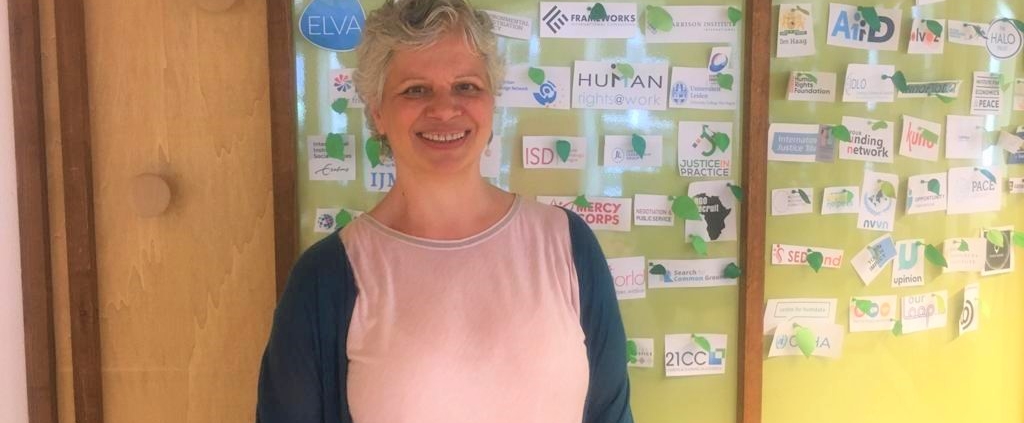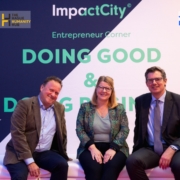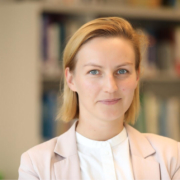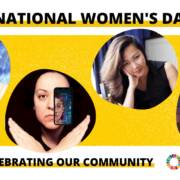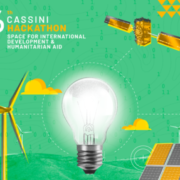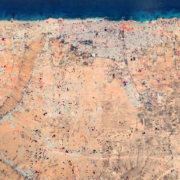Marina Antunovic, Director at Mercy Corps Netherlands
WHO IS SHE AND WHAT DOES SHE DO?
Meet Marina! When we ask this question, people usually just start with their name and their place of work. However, what struck me was that the very first thing that Marina did was to laugh and proclaim: “I am a lifelong humanitarian!”
Marina is the Director at Mercy Corps, Netherlands. Mercy Corps has officially been in the Netherlands for two years now, and Marina set-up the base for Mercy Corps in the Netherlands from scratch!
HOW DID SHE GET INTO THIS WORK?
“By being a Yugoslav!” Marina tells us, not without humour. Her first experience was with the UN Mission in Croatia during the war in Yugoslavia in 1992. From there, she joined a small Scottish agency in Bosnia, which then merged with Mercy Corps and she has now been working with Mercy Corps for more than 20 years! “To be honest, I did not think this is something I would do in the long term, but once I moved to the NGO sector, the work that we were doing in Bosnia was incredible! We repaired thousands of houses there, rebuilt schools, water and electricity supply to dozens of villages and towns, and established one of the first micro-credit agencies in Bosnia”, she says. Then followed a move to Darfur to help the organization in setting up an emergency response team there and support the mission to respond to the Darfur crisis. “Again, I fell in love with the work that we were doing and the people we were working with!” she tells us.
Over the years, Marina’s missions brought her to East Africa, Palestine and Ukraine. During that time she shifted between different roles – from finance, administration and compliance in her earlier career, to managing a large USG funded, development and recovery programme in Gaza, as well as serving as the director for the Ukraine programme. Following Brexit, Mercy Corps started looking at strategies to make sure that they could continue to collaborate with European partners, and eventually decided to establish a presence in the Netherlands. Marina hence came to the Hague at the end of 2017 and set-up an office at the Hague Humanity Hub in early 2018.
WHAT PROJECT IS SHE CURRENTLY WORKING ON?
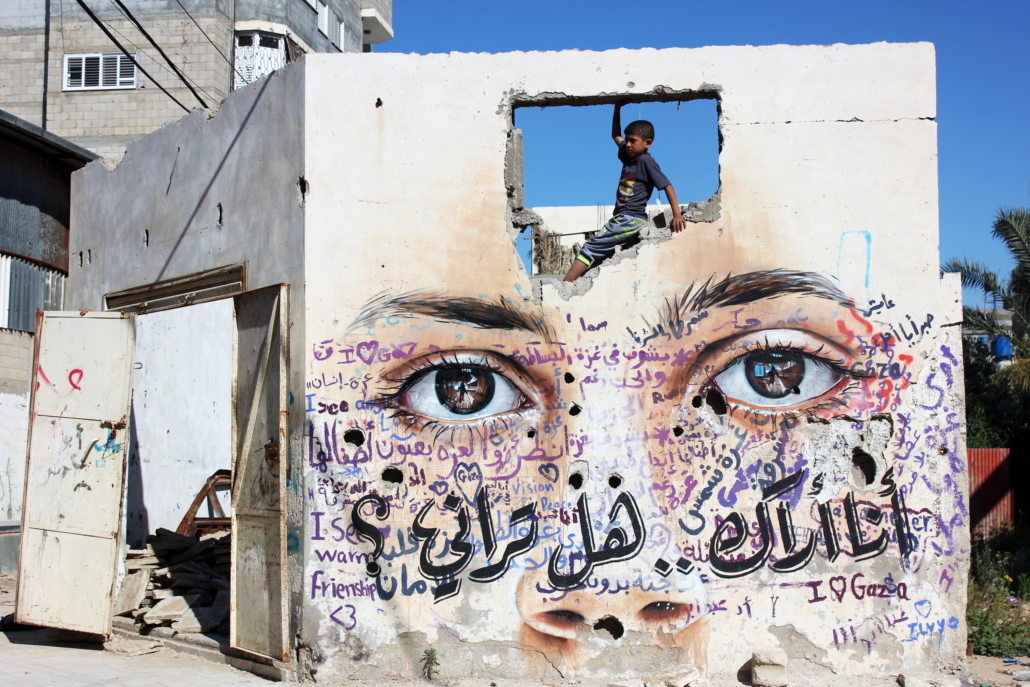
Back in June 2015, Marina was involved with an art therapy project in Gaza, where teachers trained in art therapy helped children express themselves through drawing and painting. Children painted words and pictures on walls and canvases, and local artists added finishing touches to complete the murals. ‘Al Tofah ‘, a project done by Gaza, aptART and Mercy Corps shows a finished version of the mural with the eyes done by AKUT and the words “ I See You. Do You See me? ” added by local artist Hamza Mansour. Marina further adds “I like that it captures the optimism, hope and desire to be heard and seen from a place and time of great sadness. This was an initiative that we implemented after the 2014 war in Gaza. The house that was used for the mural was destroyed during the conflict”.
Mercy Corps currently has 12 active programmes in Myanmar, Jordan, Kenya, Liberia, Uganda, Tajikistan, and many more that Marina broadly oversees. Here in the Netherlands, Marina and her team’s work revolves around staying connected to relevant professional networks, programming, advocacy and policy work. A lot of their effort goes towards increasing their profile in the Netherlands, as Mercy Corps, although a very large global NGO, still has relatively little recognition in the Netherlands or even across continental Europe.
Marina also tells us about a very interesting project, the ‘AMPERE Project ‘, that emerged out of a collaboration with the Dutch Coalition for Humanitarian Innovation (an organization also based at the Humanity Hub). The AMPERE Project is a consortium funded by RVO and led by Mercy Corps in partnership with the Response Innovation Lab, Save the Children and Netherlands Development Organisation (SNV) to test, prove and build evidence for quality, affordable, and reliable market-driven energy access solutions for humanitarian response programming in the Bidibidi refugee settlement in West Nile in Northern Uganda. The design of the project was facilitated by DCHI and supported by RVO through the Humanitarian Accelerator Programme in 2019.
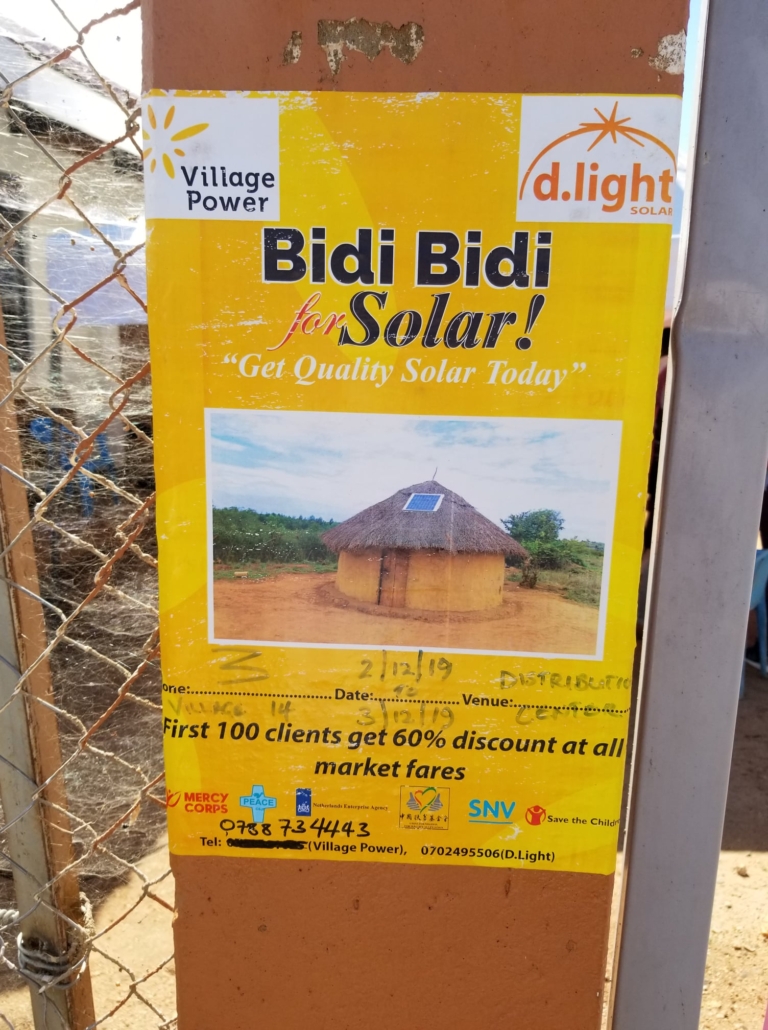
In November 2017 – Solar service partners, Village Power and d.Light commenced the “Bidibidi for Solar” marketing campaign under the STARRE/AMPERE projects in zone 3 of the Bidibidi settlements. Consumers who had saved over the months were eager to take advantage of the early-bird discounts offered by the solar companies as part of the Results-based Financing mechanism provided by the programs.
HOW DID SHE COME TO THE HUB?
“I am big big, biiig fan of the Hub!” Marina tells us with a big smile. Mercy Corps was one of the first organizations to join the Humanity Hub community. When Marina came to the Hague for the first time to look at office spaces, the Municipality introduced her to the Humanity Hub, explained the concept, and took her for a tour of the space even before it was completed! “I liked the concept of the Hub so much that I kind of decided right there and then that Mercy Corps would become a member and would use the Hub space as our base. It was such a good decision because I was on my own for a while, and it was not only nice to be a part of the initial growth of the Hub, but also see the community grow”.
She further shares, “I recommend the Humanity Hub to everybody that I meet, because I really believe in what the Hub is trying to do. It is a very worthwhile investment for all of us as members of the community to continue contributing to its mission of supporting connections and collaborations within the Hague ecosystem of Peace and Justice”.
WHAT ARE HER KEY LEARNINGS/TAKEAWAYS FROM THE CURRENT SITUATION?
For Marina, like many others, it has been adjusting her work to suit the current situation. She believes that all of us have gone through the same phases of “disbelief, panic, throwing ourselves at everything, and then slowly getting more and more organized, and henceforth finding areas where one can actually focus and do more to support the communities where we work”. Marina tells us that she is quite impressed with how the humanitarian sector has responded to the crisis globally.
For Mercy Corps, it has been quite a similar journey as well. During this time, they have also started focusing, investing more resources on “crisis analytics work”, especially in places that have acute, complex crisis situations, like Yemen or Syria. “We have looked at our strengths during this time and prioritized program and policy analysis, strengthening the ability of communities, their governments and the private sector to cope and adapt to the pandemic in a way that minimizes adverse outcomes on immediate and long-term well-being, and increased our interaction with our donors and partners”. She also adds “Our resilience systems approach has been a good investment over the years to deal with the current situation”.
WHAT IS SHE CURRENTLY WATCHING/READING/ LISTENING TO?
Marina is currently finishing ‘Here I Am’ by Jonathan Safran Foer. She enjoys all his writing, both fiction and non-fiction. “Here I Am is an amazingly rich reflection on the Jewish identity – it’s emotional, rich in cultural references both from the US and Israeli experience, and made me laugh and cry many times”. Other than this, Marina enjoys reading science fiction, and she is currently into Jeff Noon’s ‘Creeping Jenny’. He is another one of her favourite authors from the contemporary science fiction world.
Another favourite that she highly recommends is ‘Invisible Women’ by Caroline Criado Perez. She picked it up following a recommendation from Naomi, a fellow Humanity Hub member working for Elva.
WHAT IS HER ASK OF THE HUMANITY HUB COMMUNITY?
Marina sincerely hopes that all of us can go back to some sort of prolonged physical presence at the Hub soon. In her opinion, the activities that tie the Humanity Hub community together should continue, especially the conversations that the community has been having about future strategies of the Hub and identifying activities that are of interest to its members. “I do wish the members of the Hub find the time and capacity to contribute more in terms of resources and knowledge”. She further emphasizes, “For some people it is more than an office space and I would like to see that within the wider community”. She ended with some encouraging words for the Humanity Hub team and said “Keep doing what you are doing!”
Thank you, Marina, for your insights! If you would like to find out more about Marina, feel free to visit her LinkedIn page, or send her a message on Slack!

